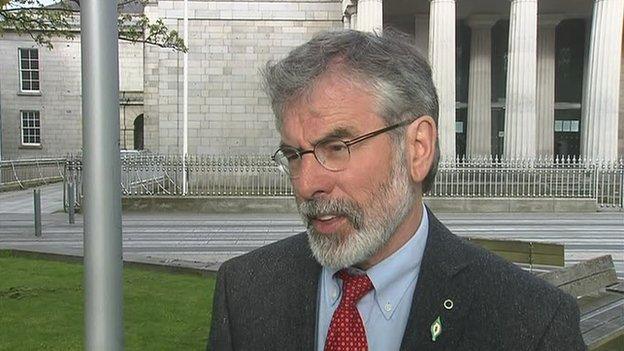Gerry Adams denies kidnapping and killing Jean McConville
- Published
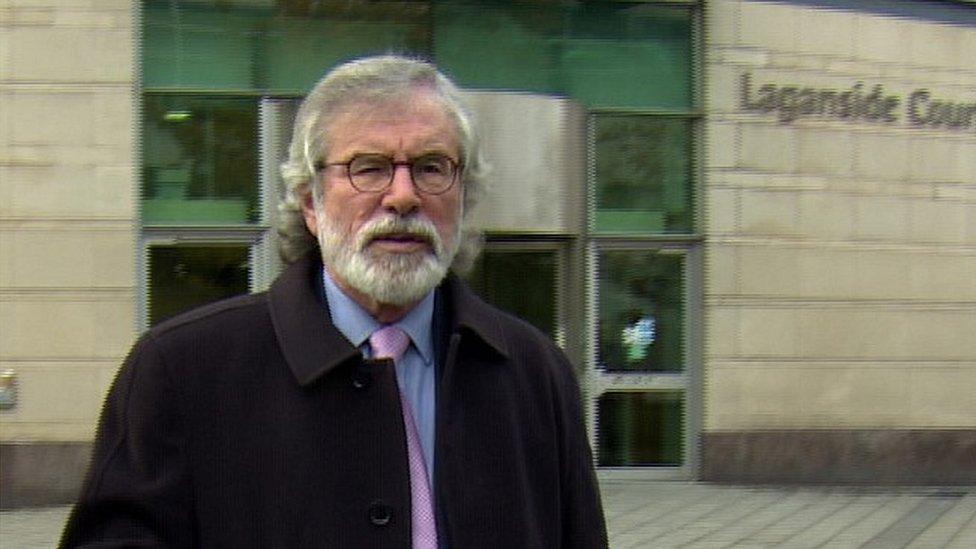
Former Sinn Féin leader Gerry Adams has denied involvement in the abduction and murder of mother-of-10 Jean McConville.
He was giving evidence during a special legal action against veteran republican Ivor Bell over the 1972 murder.
Former IRA leader Ivor Bell, from Ramoan Gardens in west Belfast, was cleared on Thursday of soliciting the widow's murder.
Mr Adams, a former West Belfast MP who is a member of the Irish Parliament, was called as a defence witness.
"I categorically deny any involvement in the abduction, killing and burial of Jean McConville, or indeed any others," Mr Adams told Belfast Crown Court on Monday.
Allegations rejected
The killing of Jean McConville is among the most notorious of the Troubles.
The 37-year-old widow was dragged from her west Belfast home in front of her children in December 1972 and bundled into a van.
She became one of the Disappeared - people who were abducted, murdered and secretly buried by the IRA during the Troubles.
In the witness box on Monday, Mr Adams repeatedly rejected allegations he was part of the IRA's Belfast Brigade when Mrs McConville was murdered.
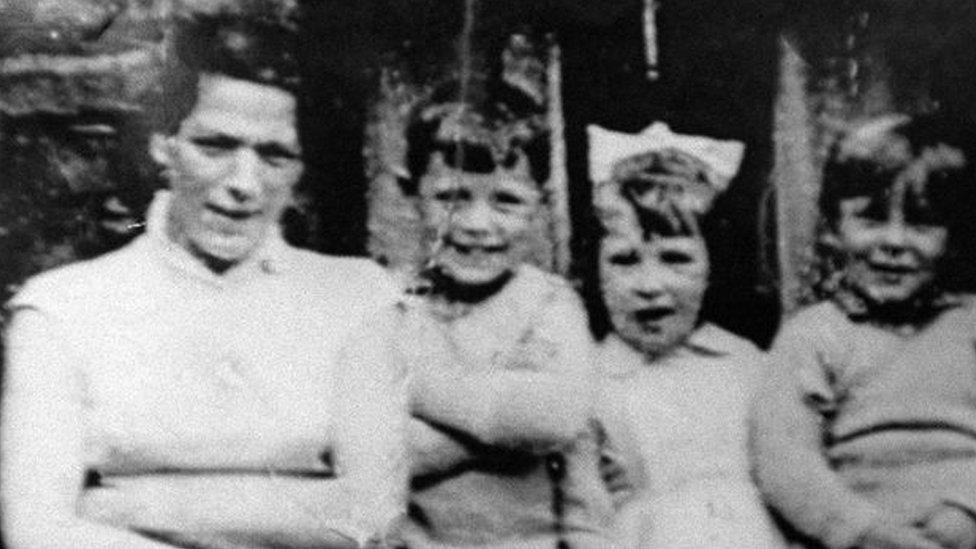
Ten children were orphaned when the IRA murdered Jean McConville in 1972
The former long-time leader of Sinn Féin also denied attending a top level IRA meeting in December 1972, at which the widow's fate was discussed.
"I never had any discussions with Ivor Bell, or indeed any others, about Mrs McConville," he said.
"I did not have any involvement in the abduction, killing and the burial of Jean McConville."
"I was at no meeting," he stressed.
The case against 82-year-old Mr Bell was based on alleged admissions made to a Boston College oral history project which were played in public for the first time during the legal action.
The judge ruled the tapes were unreliable and could not be used as evidence against him.
The comments come from a man known as Interviewee Z - alleged to be Mr Bell - who claimed to have been with Gerry Adams and other senior IRA figures at a meeting in west Belfast in December 1972, where the widow's fate was discussed.
Z's interviews were given to the Boston College oral history project, which collated accounts from former IRA and UVF paramilitaries about their activities during the Troubles on the understanding these would not be made public until after their deaths.
But the Police Service of Northern Ireland won a trans-Atlantic court battle to obtain some of the recordings.
Ivor Bell was charged with two counts of soliciting the murder of Jean McConville.
He was found unfit to stand trial and excused from attending the court hearings on health grounds, so the trial went ahead as a trial of the facts alone.
'I am not on trial'
In his evidence, Mr Adams said he did not think Mrs McConville should have been shot.
He described the shooting of so-called touts (informants) as "regrettable".
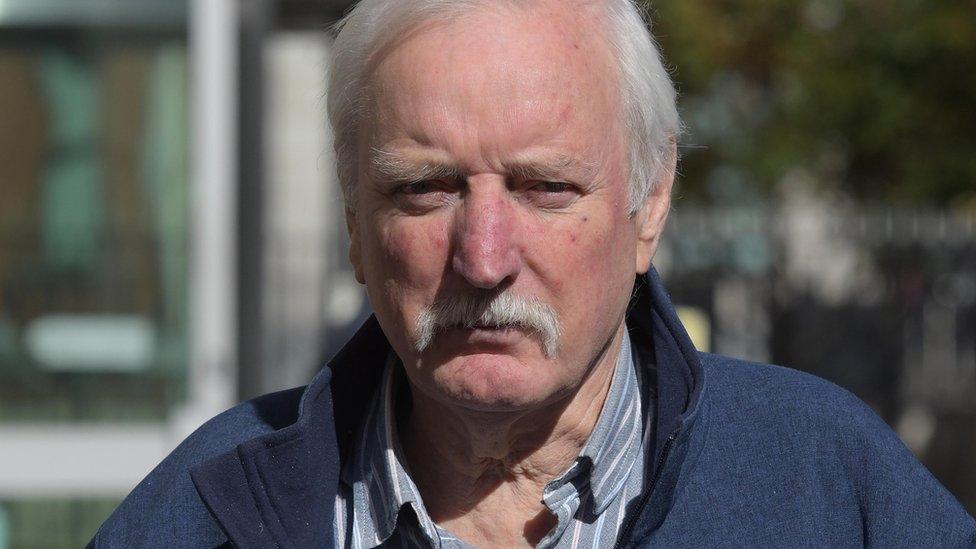
Ivor Bell was in his late 70s when he was first arrested over the McConville case
It was "not something he would advocate", the court heard.
"I don't like the word 'tout'," Mr Adams said.
"It is a regrettable fact that when armies are engaged in war, they do kill those who they perceive to have assisted the enemy.
"That goes for all combatants."
Asked by a prosecutor whether he would "have had a problem shooting touts", Mr Adams replied: "I would have a problem shooting anyone. That's a very loaded question. I am not on trial here."
In 2014, Gerry Adams was arrested and questioned for four days about the murder of Jean McConville. He was released without charge.
He told the court extracts of the tapes had been played to him during "interrogation at Antrim Barracks", but that he had not recognised the voice as that of Ivor Bell.
"Now, I have not been talking to Ivor Bell in decades, but I did not recognise that was Ivor Bell," he said.

Consistent denials at Belfast Crown Court
As the jury took their seats in court room 16 after lunch on 14 October, defence barrister Barry MacDonald QC took to his feet saying: "Mr Adams, please."
Dressed in a dark suit, blue shirt and pink tie, the former Sinn Féin leader entered the room, accompanied by his personal assistant, Richard McAuley.
Gerry Adams walked through the public gallery acknowledging five of the McConville siblings who had attended every day of the court case.
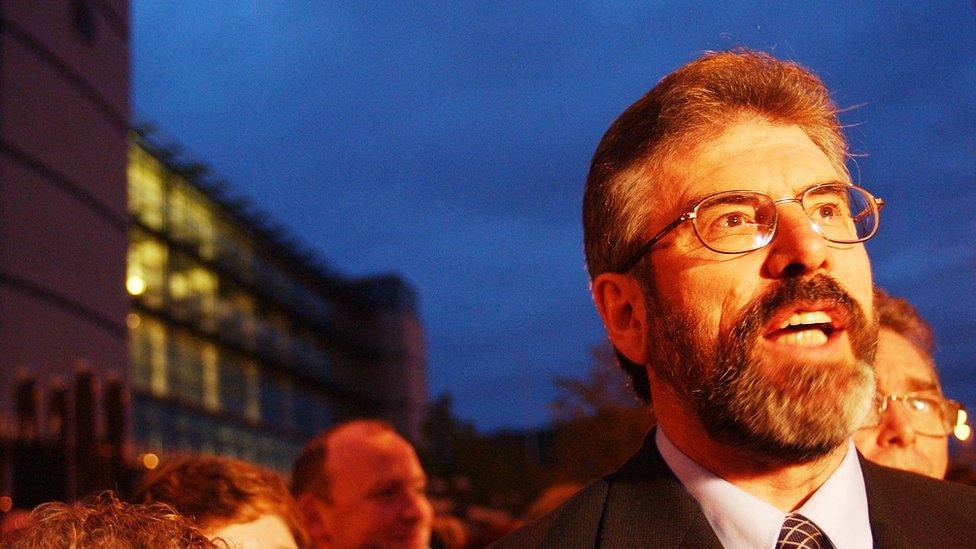
Gerry Adams, pictured here in 2002, has consistently denied any involvement in the murder of Jean McConville
Having taken his seat in the witness box, he spent an hour and fifteen minutes giving evidence - denying being in the IRA and denying any involvement in Jean McConville's murder.
For the most part, he appeared relaxed.
The only hint of agitation was when the 71-year-old asked prosecutor Ciaran Murphy QC for the collators of the Boston Tapes to be called.
"You are asking me to respond to accusation from somebody called Z. What year are we in? What place are we in?"

Mr Adams has always denied being a member of the IRA.
In court he said: "I have never hidden my associations with the IRA. I have never sought to distance myself from the IRA. I have denied IRA membership."
During his testimony, Mr Adams described the IRA as a "legitimate force", but said the so-called "disappearing" of people was "totally wrong".
He outlined his "exhaustive" efforts, alongside Catholic priest Fr Alex Reid, to have the bodies of the Disappeared recovered.
Mr Adams told the court he did not give the IRA "carte blanche" support.
"Yes, I think that the IRA was a legitimate response to British military occupation, but it could equally be said that the IRA did things that were wrong," he said.
'Most suspect'
Gerry Adams described the Boston tapes project as "most suspect".
Most of the republican interviews were conducted by former IRA member and ardent Sinn Féin critic Anthony McIntyre.
Asked why somebody would suggest he had been involved, Mr Adams said: "Reading the transcripts, I thought it was interesting that the interviewer, Anthony McIntyre, asked a lot of leading questions.
"Anthony McIntyre was involved with others in opposing, which he was entitled to do, the strategy I and others were involved in, which subsequently led to the peace process and the IRA cessations and ended the IRA effectively."
Mr Adams later added: "There's an unrepresentative cadre or cohort of either former republican activists, or some who never experienced the worst aspects of the conflict, who see myself as a traitor to the cause."
The court heard that Ivor Bell and Gerry Adams had been interned - imprisoned without trial - together during the 1970s and that Ivor Bell had a conviction for trying to help him escape.
The pair had also taken part in secret talks with the British government in London in 1972.
Prosecutor Ciaran Murphy QC asked: "Do you accept that you were in prison with Ivor Bell?"
Mr Adams replied: "I was in prison with 1,000 others. He was among them, yes."
Pressed further about their relationship, Mr Adams added: "I had forgotten that he was actually convicted. I do not want to give the impression that I did not know Ivor Bell. Of course I did."
Mr Adams said Ivor Bell had also been opposed to the direction in which he and others were taking republicanism.
Meanwhile, Mr Adams told the court he first became aware of Jean McConville when approached by her daughter, Helen McKendry.
"I'm not sure what year that was," he said.
'I am not going to take lectures'
When asked what he was doing in 1972, Mr Adams said he spent a lot of time on the run due to harassment by the RUC (police) and was "liable to be interned".
He rejected claims he had sent prominent Sinn Féin member Bobby Storey - who was described on the tape as a "clown" and an "idiot" - to make inquiries about Jean McConville.
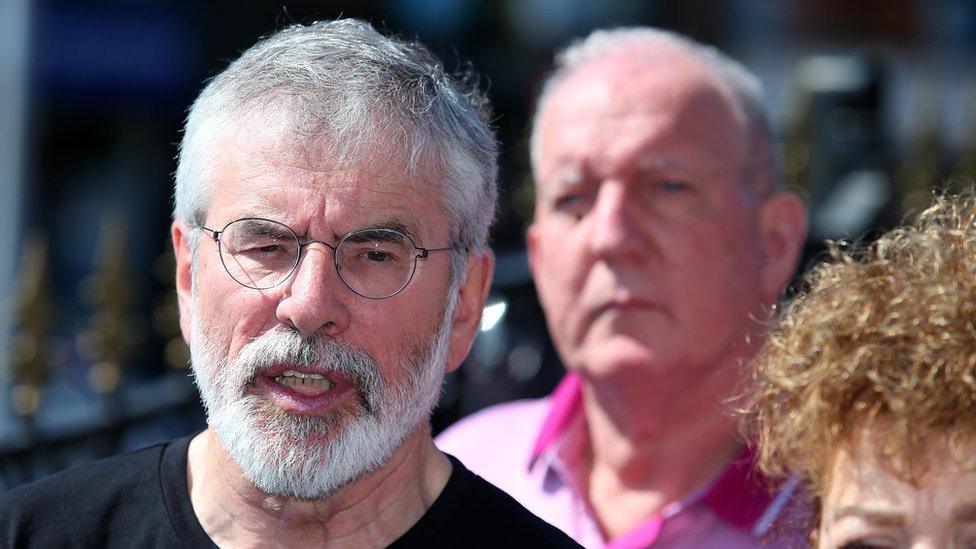
Gerry Adams pictured in 2018 with Sinn Féin member Bobby Storey
The prosecution said the allegations against Mr Adams were more than just a couple of "one-liners".
However, when it was put to him that Z said on the tape he had been recommending the murder and disappearance of Mrs McConville, he said: "I am being asked to comment on an alleged conversation they had about a meeting I have said clearly I was not at, discussing something I was not privy to."
Dismissing the taped accounts from the man known as Z, Mr Adams added: "He did an interview which was not to be released until after his death, isn't that correct?
"I am not going to take lectures from somebody like that.
"I have stated my position in relation to the IRA. Whatever his position is, is a matter for him."
- Published17 October 2019
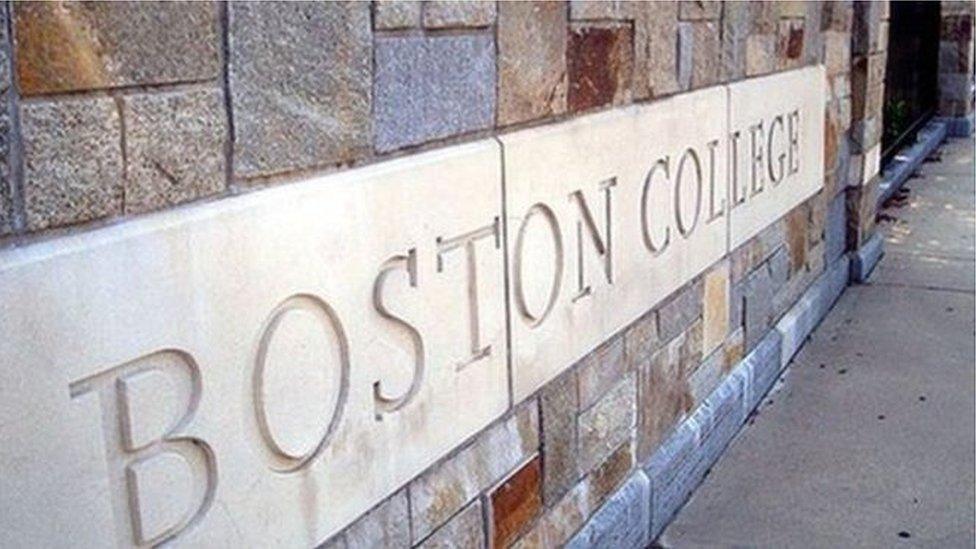
- Published14 October 2019
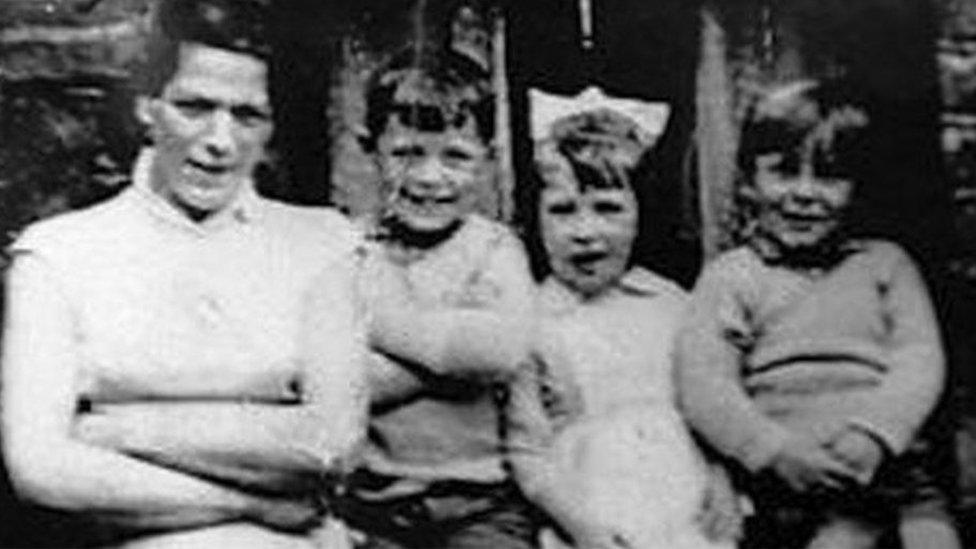
- Published20 November 2017
